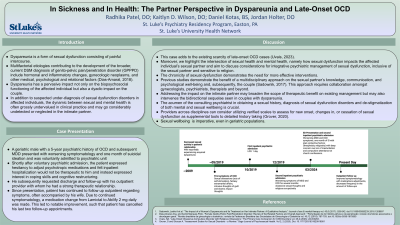Women's Mental Health
(228) In Sickness and in Health: The Partner Perspective in Dyspareunia and Late-Onset OCD

- RP
Radhika Patel, DO
Resident Physician
St. Luke's University Health Network
Easton, Pennsylvania - KW
Kaitlyn D. Wilson, DO
Resident Physician
St Luke's University Health Network
Quakertown, Pennsylvania - DK
Daniel Kotas, BS
Medical Student
Lewis Katz School of Medicine at Temple University
Philadelphia, Pennsylvania - JH
Jordan C. Holter, DO
Attending Psychiatrist
St Luke’s University Health Network
Easton, Pennsylvania
Presenting Author(s)
Co-Author(s)
Background: Dyspareunia is a form of sexual dysfunction consisting of painful intercourse. Multifactorial etiologies contributing to the development of the broader, current DSM diagnosis of genito-pelvic pain/penetration disorder (GPPPD) include hormonal and inflammatory changes, gynecologic neoplasms, and other medical, psychological and relational factors (Dias-Amaral, 2018). Dyspareunia has a pervasive impact not only on the biopsychosocial functioning of the affected individual but also a dyadic impact on the couple. However, the dynamic between sexual and mental health is often grossly undervalued in clinical practice and may go considerably undetected or neglected in the intimate partner.
Case: We present a geriatric male with a 5-year psychiatric history of OCD and subsequent MDD presenting with worsening symptomatology of both disorders and one month of suicidal ideation with plan, previously stabilized on psychotropics. Upon further elicitation, the patient reported a 15-year history of decreased sexual activity due to his wife experiencing acquired dyspareunia. He endorsed sexual obsessions consisting of acts of sexual self-stimulation, fantasy extramarital affairs, and intrusive thoughts of guilt and shame. He also endorsed chronic depression associated with feelings of worthlessness and guilt, sleep disturbances, decreased energy, decreased concentration, anhedonia, and racing thoughts. Though he cited his religious beliefs and theophobia as protective factors against suicide, he expressed deep concern over the sin of masturbation with compulsive attendance at church confessions on multiple occasions. Concerns similar to these led to a previous hospitalization years prior. The patient was medically cleared in the ED and voluntarily admitted to the psychiatric unit.
Discussion: This case adds to the existing scarcity of late-onset OCD cases (Uvais, 2023). Moreover, we highlight the intersection of sexual health and mental health, namely how sexual dysfunction impacts the affected individual’s sexual partner. The chronicity of sexual dysfunction demonstrates the need for more effective interventions. Previous studies demonstrate the benefit of a multidisciplinary approach on the sexual partner’s knowledge, communication, and psychological well-being and, subsequently, the couple (Sadownik, 2017). This approach requires collaboration among gynecologists, psychiatrists, therapists and beyond. The acumen of the consulting psychiatrist in obtaining a sexual history, diagnosis of sexual dysfunction disorders and de-stigmatization of both mental and sexual wellbeing is crucial.
Conclusion: Through the case presentation, we aim to discuss dyadic considerations of integrative psychiatric management in sexual dysfunction, inclusive of the intimate partner and sensitive to religion. An active and healthy sex life is critical, even in geriatric populations.
References:
Dias-Amaral, Ana, and André Marques-Pinto. “Female Genito-Pelvic Pain/Penetration Disorder: Review of the Related Factors and Overall Approach.” “Perturbação de dor Gênito-pélvica e da penetração: revisão dos fatores associados e abordagem geral.” Revista brasileira de ginecologia e obstetricia: revista da Federacao Brasileira das Sociedades de Ginecologia e Obstetricia vol. 40,12 (2018): 787-793. doi:10.1055/s-0038-1675805
Uvais, NA. “Late-Onset Obsessive-Compulsive Disorder with Religious Obsessions.” The Primary Care Companion for CNS Disorders vol. 25,2 (2023): 22cr03263.
Sadownik, Leslie A et al. “The Impact of a Woman's Dyspareunia and Its Treatment on Her Intimate Partner: A Qualitative Analysis.” Journal of sex & marital therapy vol. 43,6 (2017): 529-542. doi:10.1080/0092623X.2016.1208697
Presentation Eligibility: Not previously published or presented.
Diversity, Equity, and Inclusion: This submission addresses DEI topics through multiple directions. First, it brings awareness to the imperative need for further de-stigmatization of mental and sexual health, especially in relation to one another. Moreover, we highlight the importance of sexual wellbeing in the geriatric population which faces multiple barriers to fulfilling intimacy. Lastly, the poster discusses sexual dysfunction, a condition suspected to be under-diagnosed in affected individuals due to the surrounding stigma and topic sensitivity. However, addressing the impact on the intimate partner broadens the scope of therapeutic benefit on existing management but also intervenes the bidirectional sequelae seen in couples with dyspareunia.

